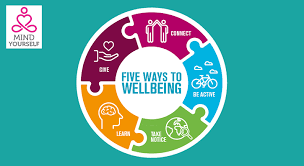Enhancing Mental Wellbeing: Strategies for a Healthier Mind

The Importance of Mental Wellbeing
Our mental wellbeing plays a crucial role in our overall health and quality of life. It encompasses our emotional, psychological, and social well-being, affecting how we think, feel, and act. Maintaining good mental health is essential for coping with stress, building healthy relationships, and achieving our full potential.
Factors Influencing Mental Wellbeing
Several factors can influence our mental wellbeing:
- Physical Health: There is a strong link between physical and mental health. Taking care of our bodies through regular exercise, proper nutrition, and sufficient rest can positively impact our mental wellbeing.
- Social Connections: Building and maintaining positive relationships with family, friends, and the community can provide support during challenging times and contribute to feelings of happiness and belonging.
- Emotional Resilience: Developing coping mechanisms to deal with stress, setbacks, and adversity can enhance our emotional resilience and protect our mental health.
- Sense of Purpose: Having goals, aspirations, and a sense of purpose in life can give us motivation and direction, promoting a sense of fulfilment and satisfaction.
Signs of Poor Mental Wellbeing
It’s important to be aware of the signs that may indicate poor mental wellbeing. These can include:
- Feelings of prolonged sadness or hopelessness.
- Irritability or mood swings.
- Social withdrawal or isolation.
- Inability to concentrate or make decisions.
- Increase in substance abuse or risky behaviours.
Promoting Mental Wellbeing
To promote good mental health and wellbeing, consider the following strategies:
- Self-Care: Prioritise self-care activities that bring you joy and relaxation, such as exercise, meditation, hobbies, or spending time in nature.
- Talk About Your Feelings: Don’t hesitate to reach out to friends, family members, or a professional if you’re struggling. Talking about your feelings can help alleviate stress and provide perspective.
- Create Healthy Habits: Establish healthy routines around sleep, nutrition, exercise, and relaxation to support your overall well-being.
- Seek Professional Help: If you’re experiencing persistent feelings of distress or anxiety that impact your daily life, consider seeking help from a mental health professional.
The Journey to Better Mental Wellbeing
Caring for your mental wellbeing is an ongoing journey that requires attention and effort. By prioritising your mental health through self-care practices, seeking support when needed,
and cultivating positive relationships and habits,
you can enhance your overall well-being
and lead a more fulfilling life.
Remember that it’s okay not to be okay sometimes,
and seeking help is a sign of strength,
not weakness.
Take small steps each day towards better mental wellbeing,
and remember that you are not alone on this journey.
Together,
we can create a society
that values
and supports
mental health for all.
Five Essential Tips for Enhancing Your Mental Wellbeing
- Practice mindfulness and live in the present moment.
- Stay connected with friends and family for emotional support.
- Engage in regular physical activity to boost your mood.
- Get enough quality sleep to rejuvenate your mind and body.
- Seek professional help if you are feeling overwhelmed or struggling.
Practice mindfulness and live in the present moment.
Practising mindfulness and living in the present moment is a powerful tip for enhancing mental wellbeing. By focusing on the here and now, we can cultivate a sense of awareness and appreciation for the present moment, allowing us to let go of worries about the past or future. Mindfulness encourages us to observe our thoughts and emotions without judgment, promoting a sense of calm and clarity. This practice can help reduce stress, improve concentration, and foster a greater sense of peace and contentment in our daily lives.
Stay connected with friends and family for emotional support.
Staying connected with friends and family is a valuable tip for maintaining good mental wellbeing. Building and nurturing positive relationships can provide emotional support during challenging times, offer a sense of belonging, and enhance overall happiness. Regular interactions with loved ones can help reduce feelings of loneliness and isolation, boost mood, and create a support system that promotes mental resilience. Whether through phone calls, video chats, or in-person meetings, staying connected with friends and family plays a vital role in promoting emotional well-being and fostering a sense of community.
Engage in regular physical activity to boost your mood.
Engaging in regular physical activity is a powerful way to enhance your mental wellbeing. Exercise has been shown to release endorphins, also known as “feel-good” hormones, which can elevate your mood and reduce feelings of stress and anxiety. Whether it’s going for a brisk walk, practising yoga, or hitting the gym, physical activity not only benefits your physical health but also contributes to improved mental health. By incorporating regular exercise into your routine, you can experience a positive shift in your mood and overall well-being.
Get enough quality sleep to rejuvenate your mind and body.
Getting enough quality sleep is essential for rejuvenating both your mind and body. Sleep plays a crucial role in mental wellbeing, as it allows your brain to rest, recharge, and process information effectively. Quality sleep helps improve concentration, mood, and overall cognitive function. By prioritising a good night’s rest, you can enhance your mental clarity, emotional resilience, and physical well-being, setting the foundation for a healthier and more balanced life.
Seek professional help if you are feeling overwhelmed or struggling.
Seeking professional help is a crucial step in prioritising your mental wellbeing when feeling overwhelmed or struggling. A mental health professional can provide support, guidance, and tools to help you navigate challenging emotions and situations. By reaching out for professional assistance, you are taking an important step towards understanding your feelings, developing coping strategies, and ultimately improving your overall mental health. Remember, seeking help is a sign of strength and self-care, and it can make a significant difference in your journey towards better mental wellbeing.
